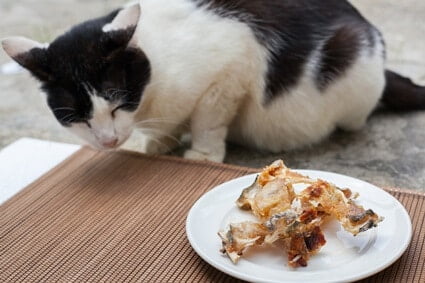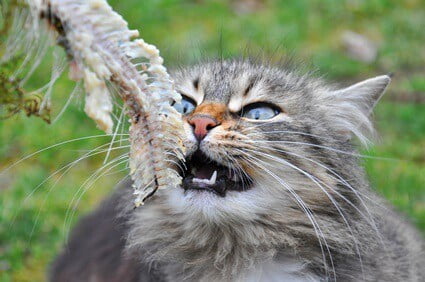Fish bones are small, numerous, and sharp. Given that many cats do enjoy eating fish, it is vital to ensure that it is safe for consumption. But, what constitutes safe from unsafe fish involves more than checking for bones.
Cats can eat fish bones, but they shouldn’t. It doesn’t matter if the bones are cooked or uncooked. They can be a choking hazard, cause internal impaction in the digestive tract, and do damage internally. If the cat tries to regurgitate the bones, they may cause further damage to the throat. Fish can be fed to cats if the bones are removed.
Fish should only be fed to cats once it has been cooked. Fish is also not a sustainable food for cats, and should only be fed to them on rare occasions. Critically, fish lacks thiamine, which cats need to survive. Raw fish also contains thiaminase, which actively breaks down thiamine in the cat’s body.
Can Cats Eat Uncooked Fish Bones?
Fish bones, cooked and uncooked, can be a choking hazard. They can also cause internal blockages that take surgery to remedy.
As fish bones are cooked, they harden and become less pliable, making them an even greater choking hazard. Raw bones still pose a risk due to their needle-like shape, size, and number.
Any bones that pass through the stomach can cause damage further along in the gastrointestinal tract. Any bones that remain in the stomach can be regurgitated, which again risks choking.
So, cats can eat fish bones, but they shouldn’t. The associated risk versus minimal reward is considered by many to not be worth it.

Can Cats Eat Cooked Fish?
Cats can eat cooked fish. It is an excellent source of protein and Omega 3, a fatty acid that assists with neurological development. It’s perfectly fine to offer small pieces of cooked fish as occasional treats or to include a small portion of fish with its usual meal.
Moderation is key when it comes to fish, however. Fish is high in certain nutrients and fats, but a cat will not derive all the nutrition it needs from a fish-based diet. Fish should be considered an occasional food. No more than 10% of its diet, and it should always be cooked.
Fish itself, cooked or uncooked, lacks thiamine, an essential vitamin. Raw fish contains thiaminase, which can break down thiamine. Feeding too much fish to your cat can result in a thiamine deficiency. As discovered by Experimental Brain Research, thiamine deficiency in cats presents itself as epileptic attacks, ataxia, and an abnormal gait. Fish also lack calcium and iron, essential minerals and nutrients for a healthy cat.
So, cats can eat fish. But, it must be cooked and in small, infrequent quantities. The bones must also be removed.
Is Fish Good for Cats?
There are many pet food brands that have fish-flavored foods or foods that contain fish. Naturally, this makes us wonder if they can include fresh fish in a cat’s diet. If fish and fish by-products are included in cat food, surely it must be good?
In moderation, fish is healthy for cats, especially for young or senior cats. Omega 3 is excellent for developing and aging bodies.
Too much fish, though, can cause nutritional deficiencies. Cats cannot survive or thrive on fish-based diets. Exclusively feeding a cat fish meat will cause thiamine deficiency, as stated in Experimental Biology and Medicine, alongside other nutritional defects. This can also be the case when including too much fish in its diet.
Fish, especially larger or predatory fish, naturally absorb mercury in polluted waters. Even a small amount of mercury can be toxic. Certain fish are safer to eat, such as salmon, sardines, and cod.
Fish living in more polluted waters naturally absorb more mercury. Researching where your fish is sourced from will help in buying healthier fish. It has also been found that predatory fish gain additional mercury by eating other fish that have already absorbed some of this substance.
If you keep to the recommended feeding frequency of fish in a cat’s diet there is a negligible risk of mercury poisoning.
What Type of Fish Are Good for Cats?
It is best to avoid oily fish, or fish preserved in oils, such as canned tuna. These oils are high in polyunsaturated fats, which can cause all sorts of health problems in cats. One such medical condition is called pansteatitis. Signs of this include:
- Depression
- Anorexia
- Poor coat quality
- Hypersensitivity
- Abdominal pain
You may also notice your cat’s behavior change for the worse. Largely, aggressive behavior when you attempt to pick it up around the stomach. This is a pain response to you applying pressure to an already painful abdomen. Your cat may hiss, struggle, and even scratch or bite you, but this is it trying to tell you that it is in pain. Untreated or prolonged cases of pansteatitis can result in death.
Ideal fish to feed cats include sardines, whitefish, and salmon. Prepared properly, small portions of these fish are safe for cats to eat. Many are also used in pet food formulas.
Fish Allergies In Cats
Cats can experience fish allergies or fish intolerances. The difference between the two is that an allergy involves the immune system, and an intolerance results in gastrointestinal issues. One is more dangerous than the other, but it is best to be wary of inciting either.
A fish allergy in cats will result in quite a bit of discomfort. Keep an eye out for the following symptoms:
- Hair loss
- Skin lesions
- Excessive itching
- Acute moist dermatitis
- Crusty papules
A fish intolerance will result in diarrhea and vomiting. If you notice any of these symptoms, stop feeding your cat fish. If the symptoms are severe or last for longer than 24 hours contact your vet.
Do Cats Need To Eat Fish?
Domestic cats have no need to eat fish. Feeding a cat a balanced diet with quality pet food provides a complete diet. However, cats can benefit from eating small amounts of fish on occasion.
Pet food companies will often include fish, or nutrients, oils, and minerals drawn from fish, in their recipes. Including pet food with these extracts will negate the need for including fresh fish into your cat’s diet.
Can Cats Eat Fish Heads?
Fish heads are the least attractive part of the fish. The meat on a fish head can be fed to your cat. Precautions must be taken, however, as the skull and other bones still pose a hazard.
If your cat chews into one of these larger bones it risks fracturing a tooth. It can also swallow a piece of bone and choke. Steam or poach the fish head. Once cooked, remove the meat and allow it to cool.
How To Prepare Fish for Cats
Raw fish can be harmful to cats. Fish fed to cats must be cooked through. Not only does this nullify thiaminase, but it kills off any pathogens or harmful bacteria.
This is best done by steaming the fish or poaching it in water. Do not add any additional seasonings, as these can be toxic or cause an upset stomach. Ensure that the fish has cooled before offering it to your cat.
Fried, baked, grilled, or battered fish should not be fed to cats. The oils and coatings of fish cooked in this manner are unhealthy for cats and can cause other health or gastrointestinal issues. If you are preparing fish for your own meal, simply cut off a small portion for your cat and cook it separately.
If you are feeding your cat fish with the skin on, ensure that all of the scales have been removed as well. These hard discs can pose a choking hazard.

How To Remove Fish Bones
Removing fish bones is a fiddly process, but a necessary one. Purchasing a boneless fish fillet is ideal. Still, check for any bones the butcher missed by firmly smoothing your fingers along the skinless side of the fillet. You will be able to feel the harder ridges of the pin bones just beneath the surface. Using a pair of needle-nosed pliers or tweezers, pull these bones out.
Cooks and butchers will normally get the majority of these pin bones out already, but it’s better to be safe than sorry.
You can also pull apart the fish once it is cooked. Cats should only be given a few small morsels, so it will be easy to ensure that no bones make it to the plate. Separate the flakes by twisting a fork into the meat. Cooked fish bones appear pale white, almost pearl-like.
Including Fish in Your Cat’s Diet
As stated in Creature Companion, fish alone does not provide a nutritionally balanced diet for a cat. If fish is to be fed to a cat, it must be a small part of a larger diet. This also includes pre-packaged cat foods, some of which contain fish.
Include fresh fish in your cat’s diet as an occasional treat, or by sprinkling a few bite-sized flakes of fish over your cat’s regular food. A cat that has not had fish in its diet previously should be slowly introduced to this new food and monitored. Changes in diet can cause an upset stomach. This is also when any food allergies or intolerances will appear.
Cats are allowed to eat cooked fish bones, but they shouldn’t. The associated health risks are too great for many, including vets – who recommend only feeding deboned fish to cats. Cooked or not, fish bones can cause choking, internal impaction, and damage to the throat and digestive tract.

